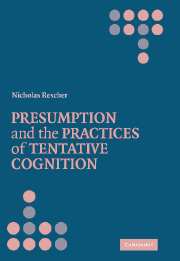Book contents
- Frontmatter
- Contents
- Preface
- Presumption and the Practices of Tentative Cognition
- 1 The Legal Roots Of Presumption
- 2 Presumption and Burden of Proof
- 3 Cognitive Presumption and Truth
- 4 Validating Cognitive Presumptions
- 5 Presumption and Inquiry
- 6 Default Reasoning
- 7 Presumption and Trust
- 8 Presumption and Communication
- 9 Presumption in Science and Beyond
- 10 Specificity Prioritization and the Primacy of the Particular
- 11 Dismissing Extremely Remote Possibilities
- Conclusion
- Bibliography
- Index of Names
3 - Cognitive Presumption and Truth
Published online by Cambridge University Press: 24 July 2009
- Frontmatter
- Contents
- Preface
- Presumption and the Practices of Tentative Cognition
- 1 The Legal Roots Of Presumption
- 2 Presumption and Burden of Proof
- 3 Cognitive Presumption and Truth
- 4 Validating Cognitive Presumptions
- 5 Presumption and Inquiry
- 6 Default Reasoning
- 7 Presumption and Trust
- 8 Presumption and Communication
- 9 Presumption in Science and Beyond
- 10 Specificity Prioritization and the Primacy of the Particular
- 11 Dismissing Extremely Remote Possibilities
- Conclusion
- Bibliography
- Index of Names
Summary
Cognitive Fundamentals
Presumptions obtain principally with two ends in view. On the one hand there are the purely cognitive presumptions made for the sake of answering our questions and filling gaps in our information (as, for example, presumptions regarding the reliability of sources). On the other hand there are practical presumptions made for the sake of guiding our decisions regarding actions (as with legal presumptions that facilitate the resolution of cases; for example, that someone long missing is dead so that the person's estate can be distributed). At present, however, the cognitive sector of presumption will be at the focus of concern, with presumption as a source of (putative) information about the truth of things in the forefront.
A cognitive presumption stakes a claim that outruns the substance of actually available information; it is a proposition that, in suitably favorable circumstances, is accepted as true in the absence of any counterindications. This is a default position affording an answer to some question of ours that we adopt for lack of anything better and will keep in place until such time as something comes along to eject it from this position of favor. In this way, cognitive presumptions function as instrumentalities of rational economy. Thanks to them we need not remain bereft of answers to our questions until all the relevant returns are in – which is to say virtually never.
- Type
- Chapter
- Information
- Presumption and the Practices of Tentative Cognition , pp. 27 - 44Publisher: Cambridge University PressPrint publication year: 2006



